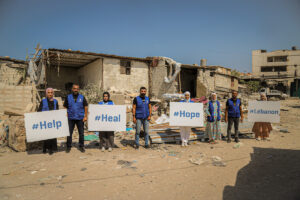
Lebanon: 2 Years On, Families are Struggling to Get by
More than 1.2 million people across Lebanon have been displaced and more than 2,700 killed as airstrikes across the country intensify further.

UP TO DATE as of 9/12/2025
UPDATE: Recent operations have resulted in at least 10 fatalities and dozens of injuries, with more than 82,630 people displaced in one week alone.
Since October 2023, alongside their bombing of Gaza, Israel has sporadically launched intense strikes on neighbouring countries, especially in southern Lebanon.
In total, over 2,700 people have been killed, many women and children. Over 12,000 more are wounded. Tens of thousands struggle to meet even their most basic needs, as the attacks only worsen the dire situation in Lebanon.

The crisis in Lebanon grows worse by the day, as intense bombing from Israel continues.
Prior, Lebanon was already devastated by an ongoing socioeconomic crisis. One that left more than 80% of its entire population living below the poverty line.
Now, with the escalating attacks, the number of casualties and internally displaced people has increased significantly.
Humanitarian needs are at an all-time high, especially among disadvantaged and refugee communities, who are unable to even access the most basic necessities.

Israel continues to launch airstrikes on Lebanon, especially targeting the south. This massive escalation has so far killed thousands of people, including hundreds of children, and has wounded thousands more.
The attacks have torn through residential areas. At least 24,000 residential buildings have been badly damaged or completely destroyed.
Furthermore, across the nation, around 1.2 million people are now displaced. Many have been displaced multiple times over the past year.
Families shelter in desperate conditions in overcrowded schools, with little access to essentials such as food and water. Hospitals are overwhelmed. Many have to halt operations to prioritise treating the huge numbers of wounded.
Islamic Relief has been working in Lebanon since 2006, supporting communities through war, displacement and the current crises. Since tensions escalated in the region in October 2023, Islamic Relief has helped thousands of people affected by the crisis.
However, we need your help to do more. Hospitals in the south are overwhelmed and are currently transferring patients to other hospitals. With Israel threatening to expand the war, we must act swiftly and proactively to reach the most vulnerable.
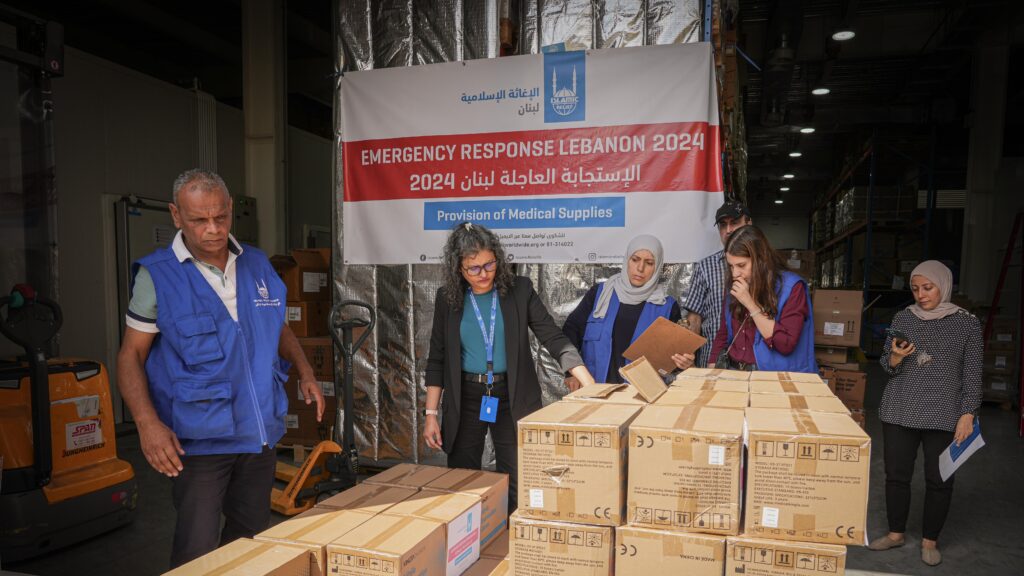
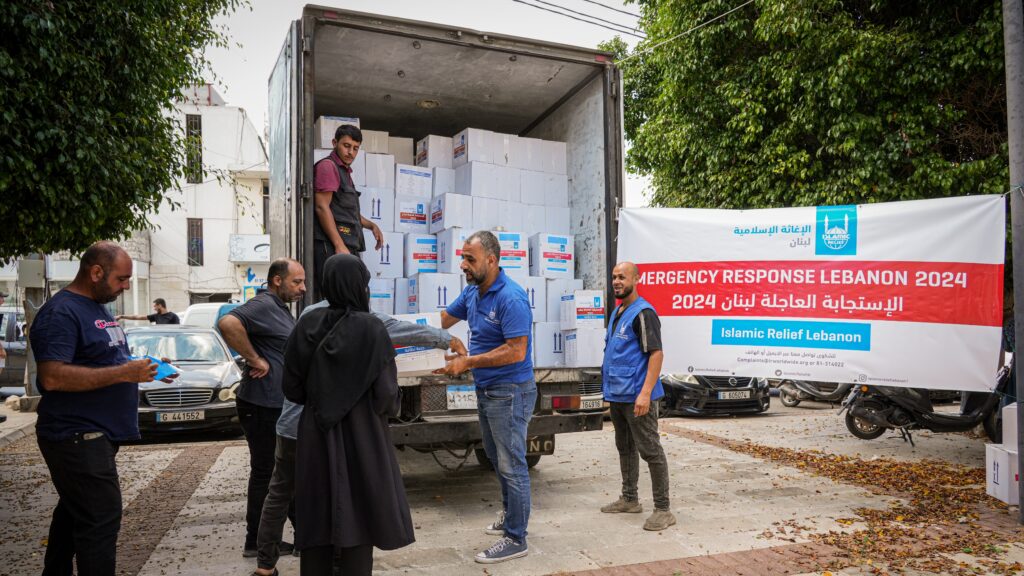
The crisis has been escalating since 8 October 2023. But on September 17-18 came a unprecedented further escalation. Pagers and communication devices were detonated across Lebanon, causing mass casualties.
On 23 September, Israel launched massive airstrikes across the south. The deadliest day in Lebanon for decades – since at least the end of the 1975-1990 civil war.
As Israeli bombing continues, the death toll continues to rise daily. At least 2,787 people have been reported killed, including hundreds of children. 12,772 people are wounded.
Around 1.2 million people have been displaced across the country. Exact numbers are hard to confirm as thousands of families are fleeing every day, with some now displaced multiple times over the past year. Roads are full of long queues of cars carrying terrified families. Some villages in the south are now virtually deserted.
Schools and public buildings have been turned into shelters and are now overcrowded with displaced families. Hospitals are overwhelmed and have had to halt operations to prioritise treating the huge numbers of wounded. On all fronts, the situation in Lebanon is worsening.
Tens of thousands of people are now sheltering in schools that have been converted into shelters, but these are extremely overcrowded.
Our staff on the ground report multiple families sharing classrooms. There is virtually no privacy, with families – including women and girls – sharing a room with complete strangers from different parts of the country.
Some families have to sleep outside in the yard or playground. In Beirut, people are sleeping on the beach in tents or under umbrellas while they try to find space in a shelter. Some families have spent whole nights going from one school to another, trying to find a space.
There are also very limited facilities. In many shelters, more than 100 people share a single toilet and there are no showers. There is a shortage of food, water, and hygiene items such as sanitary pads.
Lebanon has been suffering major power shortages even before this escalation, and there is no power in many of the shelters. This puts people at further risk, especially at night.
The situation is changing rapidly by the day. Most of the bombing is currently in southern Lebanon and the Bekaa Valley in the east of the country. However, there have also been bombings in Beirut and other areas such as Baalbek.
Currently, many families are leaving southern Lebanon and heading to areas that they hope are safer, such as parts of Mount Lebanon and the north of the country. People are fleeing, however they can. Some people have cars, others have piled onto crowded trucks, and some have walked part of the way.
The crisis is affecting everyone, including Lebanese citizens and the many refugees living in the country. Lebanon hosts an enormous number of refugees, including around 1.5 million people who fled the crisis in neighbouring countries.
Other vulnerable groups are people with disabilities, elderly people and young children. As they are most at risk and need our support.
Women and girls in shelters too, also face higher risks. The shortage of toilets means there is often no separate toilet for women and girls. There is a lack of sanitary products available and a lack of privacy. There are concerns about safety, with no locks on doors and poor lighting at night.
Most shelters are not designed for elderly people or people with disabilities. One of our staff reported that a person in a wheelchair is stuck in their room for most of the day as they can’t get outside.
The crisis in Lebanon has been escalating since 8 October 2023. Over the past year, hundreds of Israeli airstrikes forced over 110,000 people in Lebanon from their homes – even before the new mass displacement of the past few days.
Before this week, bombings destroyed or significantly damaged at least 24,000 homes. They disrupted access to essential services such as water systems. Farms and markets were damaged, harming food production and availability.
The country is in turmoil and the latest escalation is compounding the economic crisis that has hit Lebanon in recent years. The need for humanitarian aid is greater than ever.
Islamic Relief has launched a $19 million AUD to scale up our response to support people who are affected and displaced by the escalating attacks.
Over the past year, since the crisis escalated in October 2023, we have provided over 41,000 displaced people with aid such as food parcels, hygiene kits, mattresses, and blankets. We also provided medical items to hospitals and satellite clinics. Our interventions have been particularly critical in Mount Lebanon, Nabatieh, Tyre, Bekaa, and Baalbek, where most of the displaced have sought refuge.
Now we are distributing ready to eat food, blankets and mattresses to newly displaced families in several school shelters. We are also distributing hygiene kits and dignity kits, which include things like sanitary pads and products for women and girls, as well as providing solar lamps in some shelters where there is no lighting.
In the coming days, we hope to distribute 2,000 food parcels a day. We plan to also provide food vouchers and cash to help displaced families buy what they most need and support primary health centres to deliver emergency services including maternal and newborn care and psychological first aid to traumatised families. We also plan to distribute warm clothing as we head into winter.
Islamic Relief has worked in Lebanon since 2006. We have a large team, most of whom are Lebanese, based all over the country. Our staff are delivering aid directly.
Yes, we coordinate closely with other key actors, to ensure that we do not duplicate activities and can respond with the most appropriate aid in the locations where the biggest needs are. For example, we are part of the Food Security Working Group led by the World Food Programme (WFP) and the Basic Assistance Working Group led by UNHCR.
We also coordinate closely with other local and international NGOs, and with local authorities and technical ministries. These include the Disaster Risk Reduction (DRR) and Disaster Risk Management (DRM) focal points in the governorates where we are working. We also coordinate with UNIFIL, the peacekeeping mission, to ensure safe access to people in need in parts of the south.
We are relieved that so far none of our staff have been hurt. Although, one staff member has had to evacuate their family home in the south.
We are extremely sad that two UNHCR staff are among those killed so far. Humanitarian workers must be protected and must be able to safely access people in need.
One of the children who receives Islamic Relief sponsorship was injured by airstrikes, and his mother is currently in hospital. We are following up with the family.
Last year, our work in Lebanon helped more than 196,000 people. Our work includes projects that support refugees and local host communities.
We provide lifesaving medical operations and supplies to healthcare facilities, repair water networks and provide clean energy and solar power. During the cold winter we also provide poor families with fuel, food and blankets, and we also carry out annual Ramadan and Qurban distributions.
Our longer-term programming has had to be temporarily suspended due to the security situation, and we are currently focusing on scaling up our emergency response.
The needs are enormous and are growing every day. We have been providing aid to those displaced throughout the past year. Now, our aim is to scale up these projects to reach many more people.
We are working with trusted suppliers and banks and are currently able to procure and distribute more aid. However, the longer the crisis goes on and the more it escalates, the harder this will get. We are already starting to see prices of essential items rise in local markets as supplies diminish.
We are calling for an immediate ceasefire in Gaza, Lebanon and the wider region.
This escalation in Lebanon comes while Israel continues to attack Palestinian civilians in Gaza and the West Bank. Islamic Relief is calling on international governments to do all they can to demand an end to the violence across the region.
International law must be upheld. Civilians must be protected, civilian infrastructure such as schools and hospitals must not be targeted, and humanitarian agencies must have safe, unimpeded access people in need. We have seen over the past year how international law is being violated on a daily basis.
Governments must step up diplomatic pressure on Israel to end attacks on civilians and violations of international law across the region, including by ending arms sales.
We are also calling on international governments to ensure the humanitarian response in Lebanon is fully funded, especially as needs rise even further.

More than 1.2 million people across Lebanon have been displaced and more than 2,700 killed as airstrikes across the country intensify further.
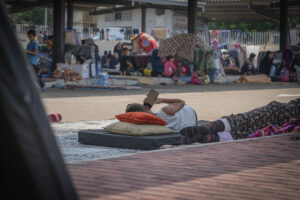
More than 1.2 million people across Lebanon have been displaced and more than 2,700 killed as airstrikes across the country intensify further.
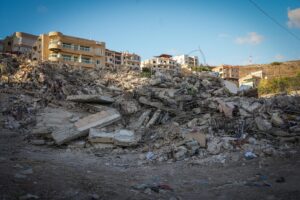
Islamic Relief aid workers in Lebanon’s Bekaa valley have described a night of terror as the region suffered its deadliest bombing yet.